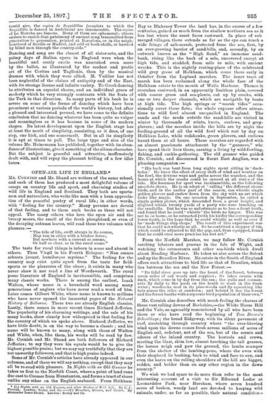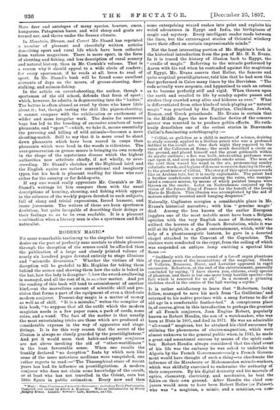OPEN-AIR LIFE IN ENGLAND.*
Mn. CORNISH and Mr. Shand are writers of the same school, and each of them has produced a most delightful volume of essays on country life and sport, and charming studies of wild life in England and Scotland. They both are sports-
men and naturalists, who write like men with a keen apprecia- tion of the peaceful poetry of rural life ; in other words, with "feeling for the country." Many persons are devoid of that feeling, and to them such books as these will not appeal. The many others who love the open air and the breezy moors, the smell of the fresh ploughland, or even of the decaying autumn leaves, will read these two volumes with pleasure :—
" The tide of life, swift always in its course,
May run in cities with a brisker force; But nowhere with a current so serene, Or half so clear, as in the rural scene."
The taste for rural things is inborn in some and absent in others. Thus Virgil in his Fourth Eclogue "Non omnes arbusta juvant, humilesque myricae." The feeling for the
country may exist quite apart from the taste for field- sports or the pleasures of the chase ; it exists in many who never show it nor read a line of Wordsworth. The rural prose literature of England is inexhaustible, and comprises many classic works. There is among the earliest, Izaak Walton, whose name is a household word among many generations of anglers who have never read a word of him.
Later comes Gilbert White, whose name is known to millions
who have never opened the immortal pages of the Natural History of Selborne. These two are already English classics.
Lastly, there comes in more recent times Richard Jefferies. The popularity of his charming writings, and the sale of his many books, show clearly how widespread is that feeling for the country of which we spoke above. Richard ;Jefferies, we have little doubt, is on the way to become a classic ; and his name will be known to many, along with those of Walton
and White, when, like them, his works will be read by few. Mr. Cornish and Mr. Shand are both followers of Richard Jefferies ; to say they were his equals would be to give the highest possible praise; but we may say truthfully that they are not unworthy followers, and that is high praise indeed.
Some of Mr. Cornish's articles have already appeared in our columns, and of these we will say nothing, except that they may all be re-read with pleasure. In Nights with, an Old Gunner he
takes us first to the Norfolk Coast, where a point of land runs due east to Cromer from Hunstanton, and forms a tract of shore unlike any other on the English seaboard. From Holkham
• (1.) Nights with an Old Gunner, and other Studies of Wild Life. By C. J. Cornish. London: Seeley and Co.—(2.) Mountain, Stream, and Covert. By Alexander Lines Shand. London: Seeley and Co.
Bay to Blakeney Tower the land has, in the course of a few centuries, gained as much from the shallow northern sea as it has lost where the coast faces eastward. In place of sub. merged villages, there extends as far as the eye can reach a wide fringe of salt-marsh, protected from the sea, first, by an ever-growing barrier of sand-hills, and, secondly, by an outwork known as the " High Sand," an immense sand- bank, rising like the back of a sole, uncovered except at high tide, and studded, from mile to mile, with ancient wrecks. This is the nightly resting-place of the celebrated wild grey geese of Holkham, which come there early in October from the Lapland marshes. The inner tract of marsh has been reclaimed along the whole face of the Holkham estate to the month of Wells Harbour. Thence it stretches eastward, in an apparently limitless plain, covered with coarse grass and sea-plants, cut up by creeks, with one or two deeper channels, which are navigable by boats at high tide. The high springs or "marsh tides" occa- sionally cover these flats; the whole expanse offers attrac- tions to wild fowl almost unequalled in England. The sands and the muds outside the sand-hills are visited in winter by thousands of stints, knots, curlews, and grey- plovers ; and the marshes inside the hills are by night the feeding-ground of all the wild fowl which rest by day on Holkham Lake, while redshanks, green plovers, and curlews haunt them at all hours. These marshes are regarded witb an almost passionate attachment by the "gunners," whc have spent their lives there, earning a living by wild-fowling, fishing, and cockle-gathering. The old gunner who guided
Mr. Cornish, and discoursed in fluent East Anglian, was a pleasing companion :- " His back was bent from long nights spent sitting in ' duck- holes.' He knew the effect of every shift of wind and weather on the fowl, the devious ways and paths across the marshes, and the hours at which the creeks could be crossed at all states of the tide. His keenness for sport was inexhaustible, as the following anecdote shows. He is an adept at calling' the different shore- birds, and in the earlier part of the season, can whistle single golden plovers and curlew down from the sky with an art which looks like magic. On one occasion in September, he called a. single golden plover, which descended from a great height, and alighted within twenty yards of a party who were lunching on the sandhills. But he was so unfortunate as to lose a front tooth, and found that he could • whistle' the birds no longer. This was not to be borne, so he extracted (with his knife) the corresponding lower tooth, in the hope that he could whistle as well as ever if he • made things shipshape.' The result of this experiment was that he could not whistle at all. So he contrived a stopper of tin, which could be adjusted to fill the gap, and, thus equipped, found that he could once more practise his lost art."
From the Norfolk Marshes, we may follow Mr. Cornish catching lobsters and prawns in the Isle of Wight, and watching the cormorants and other sea-birds which dwell about Brading Harbour. He takes us also across the Solent and up the Beaulieu River. No estate in the South of England offers such attractions to bird life as that of Beaulieu, which lies between the sea and the New Forest :—
"Its tidal river goes up into the heart of the forest, between seven miles of oak woods and coppices ; its lakes swarm with duck, which come in by day from the sea ; the gulls and cormor- ants fly daily to the pools on the heath to wash in the fresh water; woodcocks nest in its pine-woods and fly squeaking like bats across the rides at sundown ; and behind it lies the forest and the forest heaths with a separate bird population of their own."
Mr. Cornish also describes with much feeling the charms of those vast rolling downs of Berkshire,—the White Horse Hill and the Vale, so agreeably remembered by all who have been
there or who have read the beginning of Torn Brown's Schooldays; the broad Ridgeway, with its silent pavement of turf, stretching through country where " the ever-blowing wind upon the downs comes fresh across millions of acres of
English soil, redolent, not of the sea, but of the scents and odours of the inland country. The kestrels and crows,
meeting the blast, skim low, almost touching the tall grasses, the horses neigh and paw the ground, the lambs scamper from the shelter of the lambing-pens, where the ewes with their shepherd lie basking, back to wind and face to sun, and even the hares on the rolling shoulders of the hill are bigger, redder, and bolder than on any other region in the down country."
We wish we had space to do more than refer to the most interesting account of a visit to Sir Edmund Loder at Leonardelee Park, near Horsham, where seven hundred acres of broken, woody land are devoted to keeping wild animals, under, as far as possible, their natural conditions. Here deer and antelopes of many species, beavers, emus, kangaroos, Patagonian hares, and wild sheep and goats are turned out, and thrive under the Sussex climate.
In Mountain, Stream, and Covert Mr. Shand has reprinted a number of pleasant and cheerfully written articles describing sport and rural life which have been collected from various magazines. There is more sport, in the form of shooting and fishing, and less description of rural scenery and natural history, than in Mr. Cornish's volume. That is a reason why it should appeal to a wide circle of readers ; for every sportsman, if he reads at all, loves to read of sport. In Mr. Shand's book will be found some excellent accounts of days on the moors, of grouse-shooting, deer- stalking, and salmon-fishing.
In the article on covert-shooting, the author, though a sportsman of the old school, defends that form of sport ; which, however, he admits, is degenerating into the " battue." The battne is often abused as cruel by those who know little about it ; but, though testing the skill like pigeon-shooting, it cannot compare with the exhilaration or excitement of wilder and more irregular work. The desire for enormous bags has led to the breeding of excessive numbers of tame pheasants, and "sport "—which, we take it, means essentially the pursuing and killing of wild animals—becomes a mere shooting-match. Still to say that it is more cruel to shoot down pheasants which have been reared in coops than pheasants which were bred in the woods is ridiculous. The over-preservation on grouse moors is bringing its own remedy in the shape of the mysterious disease which the highest authorities now attribute chiefly, if not wholly, to over- crowding. Mr. Shand's sketches of the Highland laird and the English squire are rather conventional and imaginary types, but his book is pleasant reading for those who care either for the country or for field-sports.
If any one would really appreciate Mr. Cornish's or Mr. Shand's writings let him compare them with the usual descriptions of hunting, shooting, and fishing which appear in the columns of the weekly papers devoted to such subjects, fall of slang and trivial expressions, forced humour, and inane jocoseness. The writers of these are keen sportsmen doubtless, but quite incapable of describing their doings or their feelings so as to be even readable. It is a pleasant combination when a literary man is also a sportsman and field naturalist.



































 Previous page
Previous page